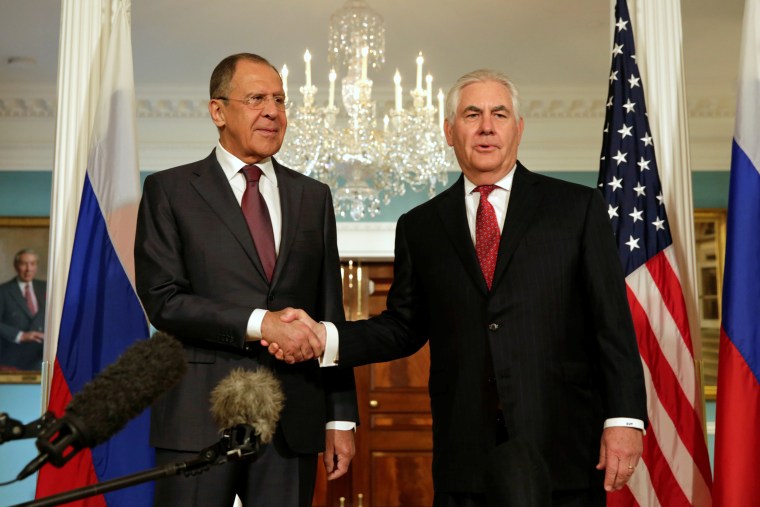WASHINGTON — Secretary of State Rex Tillerson this weekend aimed to defend the Trump administration from reports that Russia’s attempts to interfere with the 2016 election did not come up during in-person meetings and conversations between the White House, State Department, and Russian Foreign Minister Sergei Lavrov in the nation’s capital this week.
"I think we have such a broad range of important issues that have to be addressed in the U.S.-Russia relationship," TIllerson said during an exclusive interview on "Meet The Press" aired Sunday. "Obviously the interference in the election is one of those. I think it's been well documented, it's pretty well understood, the nature of that interference, here and elsewhere."
He added, "I think we have to look at this relationship in its broadest contours, and there are many, many important areas which require our attention if we are to bring it back to a relationship that we believe is necessary for the security of the U.S."
On Wednesday, during Lavrov’s first trip to Washington, D.C. of the Trump administration, Tillerson hosted the foreign minister at the State Department and President Trump hosted him in the White House Oval Office.
Lavrov told reporters during a press conference after the White House meeting that the “absurd issues" of election interference issue did not come up during their meetings. He even pointed to President Trump’s own assertions that the story was “fake news.”

Watch the full interview with Secretary of State Rex Tillerson on "Meet the Press" Sunday
"There is not a single fact, there is no compelling evidence given to anyone regarding Russia's intervention and that is it," Lavrov said.
Pressed again on "Meet The Press" this weekend why the issue of election meddling would not come up in these conversations, so as to help the two countries begin from a "clean state" with the new administration, Tillerson said, "I think it's important to understand we're not trying to start with a clean slate."
"I think terms like having 'a reset' are overused," Tillerson continued. "You cannot reset. You cannot erase the past. You cannot start with a clean slate... We're starting with the slate we have."
Also on "Meet The Press," Sen. Lindsey Graham, R-S.C., said it was "absolute not" possible for the United States to move forward in its relationship with Russia until the issue of election meddling has been addressed.
"Russia didn't change the outcome of the election, but they sure as hell tried," Graham said. "And I want to punish the Russians. And I hope the president will see their interference as a threat to our democracy."
While Trump refused for months to acknowledge conclusions from numerous intelligence agencies that the Kremlin devised numerous tactics to try to influence the American electorate ahead of the 2016 election, Tillerson this weekend again acknowledged that he does not believe there's any question “that the Russians were playing around in our electoral processes."
And the secretary of state continued to describe the relationship between the United States and Russia as at "an all time low point since the end of the Cold War, with a very low level of trust."
"I think it's largely viewed that it is not healthy for the world," he said. "It's certainly not healthy for us. For the American people, our national security interest and otherwise, for this relationship to remain at this low level. Whether we can improve it or not remains to be seen."
